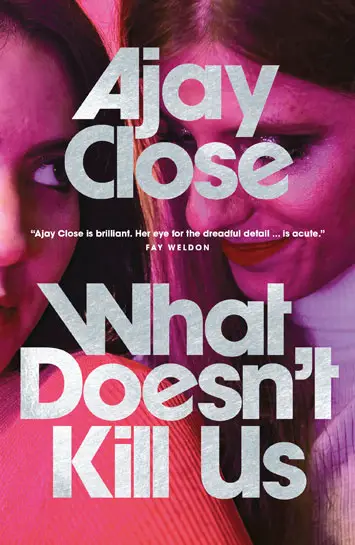What Doesn’t Kill Us by Ajay Close – Review

By Nigel Armitage
Britain in the 1970s. “Women got battered all the time – neighbours, dinner ladies, the lass on the meat counter in Fine Fayre.” Ajay Close’s hugely compassionate and compelling novel begins with the voice and testimony of a woman who grew up during that period. What follows is a story of a group of disparate but bonded women living together under one roof in Leeds at a time of terror for women in northern England because a serial killer is on the loose. The local police force, hamstrung by a culture of misogyny and incompetence, appears powerless to catch the killer. In these dreadful and terrifying times, how can women fightback and assert what in anything resembling a just society would not need asserting; the right for women to not get ‘battered’. The right, in fact, to live and to thrive.
It is a setting that readers will immediately recognise as paralleling that of the Peter Sutcliffe case and how police blunderings in that investigation meant that he evaded arrest for several years. In this story, the unknown killer’s monikers include The Butcher and the Yorkshire Male. But What Doesn’t Kill Us is resolutely not about Him, but about what’s termed today the ‘lived experience’ of the respective female characters. The novel’s deeply ironic title sets the tone. Here is a world in which serving male police officers call female sex workers ‘bags’, and where violence perpetrated by males against their female partners is both common-place and trivialised in society at large.
PC Liz Seeley, recently attached to the squad with responsibility for catching the killer, must suffer a violent boyfriend at home and a deeply ingrained sexist working environment. Her survival and safety necessitate a move into a feminist collective in inner-city Leeds, bringing her into personal contact with a group of women who not only don’t accept the patriarchy and what that means for the exploitation and denigration of women, but are intent on doing something about it. The story subtly explores Liz’s difficult balancing of her new home life – feminist theory, protest, direct (and sometimes illegal) action – and her working life in an organisation steeped in chauvinism and male privilege. Themes of class and identity are also skilfully interweaved, as in Liz’s clash with ‘posh’ Rowena, who moves into the collective after Liz but who soon exerts a dominating influence in the household.
 “Self-expression and rage”
“Self-expression and rage”
“’You’ve no idea, have you?’ Even Liz could hear this came out a bit snappy.
‘So tell me.’
She didn’t know where to start. How were you s’posed to make somebody understand, when you couldn’t say it’s a bit like this or that, cos you’d got absolutely nothing in common?”
Charmaine – young, black, and a talented art college student – must negotiate both racism and the condescension of her male tutors and fellow students. The art she creates is one of the means by which she fights back, asserting her right of self-expression and rage at the prevailing realities. In a character portrayal that appears as authentic as it is heartfelt, the story explores these themes with insight and empathy.
Indeed, the same can be said of all the story’s characters. In evidence throughout is the writer’s meticulous research and commitment to a wholly convincing representation of the period. The setting is, of course, often one of hostility and violence, but it is also one of women’s voices, articulating experiences and ideas. At points in the story, the narrative is given over to these voices, in the form of typescripts from house meetings between the collective members. The effect is powerful, moving, and sometimes funny.
What Doesn’t Kill Us is a distinctive novel in its ambition of combining police procedural elements – the hunt for the serial killer is real and desperate – with an exploration of what it meant to be female during those deeply troubling times. It is an ambition that is entirely and successfully realised.
We know how the saying that forms the novel’s title ends. The shameful tragedy and lesson of this book is that the saying remains as relevant today as the period in which it is set. Absorbing and thought-provoking in equal measure and a brilliant read.
‘What Doesn’t Kill Us’ by Ajay Close is published by Saraband









